When MARK HARRISON realised his favourite artists all used the same trick, he decided to try the same. He shows how lost edges can create a more painterly finish

When I was looking at the work of artists that I admire recently, I realised there was a common thread that ran through almost all of them: they lose edges and merge shapes together. This not only helps the atmosphere of the painting, as things are suggested rather than stated, but also the design (composition) becomes stronger as the shapes become larger.
The painting can then work on two levels: as a representational image (a location or figure, for example) and as a group of shapes that can have an abstract quality to them – a design, or a pattern if you like.
I decided that I needed to remind myself of this basic approach and so I wrote it down on a piece of paper and stuck it to my easel: “Lose edges, join shapes.” The phrase became a kind of mantra.
A second mantra developed – “It’s the painting, not the place” – that was a reminder not to be too literal and illustrative by trying to include everything in front of me.
For this masterclass, I chose to paint a scene from Venice that could easily have been very descriptive as it was filled with crumbling textures, distinctive architecture and canal reflections. I wanted to get across the mysterious side of the Italian city, however, so I kept tempting detail down to a minimum and focused on losing edges and joining larger shapes to give the painting a stronger design. www.paintingsbymarkharrison.com
1 Sketch roughly
I started by very roughly drawing out the composition, just to see how it would fit in the canvas format. I adjusted the placement of the buildings and key elements slightly to get a better composition and roughly drew it in with a small Bristlewhite brush, using a mix of Burnt Sienna and Winsor Violet thinned with Liquinand (to get it to dry quicker) Lukas Medium 5. When I needed to remove or correct lines, I erased them with a rag dipped in clean turpentine.
この記事は Artists & Illustrators の September 2019 版に掲載されています。
7 日間の Magzter GOLD 無料トライアルを開始して、何千もの厳選されたプレミアム ストーリー、9,000 以上の雑誌や新聞にアクセスしてください。
すでに購読者です ? サインイン
この記事は Artists & Illustrators の September 2019 版に掲載されています。
7 日間の Magzter GOLD 無料トライアルを開始して、何千もの厳選されたプレミアム ストーリー、9,000 以上の雑誌や新聞にアクセスしてください。
すでに購読者です? サインイン

Still life IN 3 HOURS
Former BP Portrait Award runner-up FELICIA FORTE guides you through a simple, structured approach to painting alla prima that tackles dark, average and light colours in turn
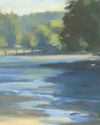
Movement in composition
Through an analysis of three masterworks, landscape painter and noted author MITCHELL ALBALA shows how you can animate landscape composition with movement
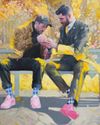
Shane Berkery
The Irish-Japanese artist talks to REBECCA BRADBURY about the innovative concepts and original colour combinations he brings to his figurative oil paintings from his Dublin garden studio
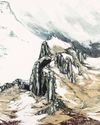
The Working Artist
Something old, something new... Our columnist LAURA BOSWELL has expert advice for balancing fresh ideas with completing half-finished work
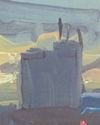
Washes AND GLAZES
Art Academy’s ROB PEPPER introduces an in-depth guide to incorporating various techniques into your next masterpiece. Artwork by STAN MILLER, CHRIS ROBINSON and MICHELE ILLING
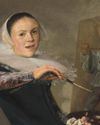
Hands
LAURA SMITH continues her new four-part series, which encourages you to draw elements of old master paintings, and this month’s focus is on capturing hands

Vincent van Gogh
To celebrate The Courtauld’s forthcoming landmark display of the troubled Dutch master’s self-portraits, STEVE PILL looks at the stories behind 10 of the most dramatic works on display
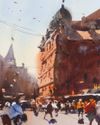
BRING THE drama
Join international watercolour maestro ALVARO CASTAGNET in London’s West End to paint a dramatic street scene
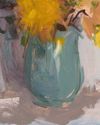
Serena Rowe
The Scottish painter tells STEVE PILL why time is precious, why emotional responses to colour are useful, and how she finds focus every day with the help of her studio wall

Bill Jacklin
Chatting over Zoom as he recovers from appendicitis, the Royal Academician tells STEVE PILL about classic scrapes in New York and his recent experiments with illustration